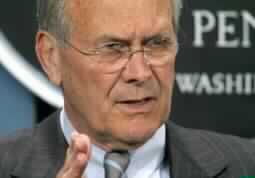HIGHLIGHTS: Intensity of Fire Less Ferocious Now||Tension in Subcontinent Negatively Affects Anti-Qaeda Campaign in Afghanistan||A String of High-level Western Officials Visits Islamabad & New Delhi||STORY:
Indian and Pakistani forces fired mortars and artillery across their cease-fire line in disputed Kashmir on Friday as international pressure mounted on the nuclear neighbors to avert war.
The shooting came after President Bush decided to send Defense Secretary Donald Rumsfeld to both nations next week to ease tensions stoked by a May 14 raid on an army camp in Indian Kashmir. New Delhi blamed Pakistan-based militants for that attack. (Read photo caption)
However, Indian defense officials said that the intensity of the fire has considerably come down.
According to the sources no deaths were reported. India and Pakistan also exchanged routine small arms and heavy machine gun fire in other places along the international border and the cease-fire line that divides Kashmir between India and Pakistan.
The United States and other western countries have advised their nationals to consider leaving both India and Pakistan.
TENSION IN SUB-CONTINENT NEGATIVELY AFFECTS ANTI-QAEDA CAMPAIGN IN AFGHANISTAN
The announcement in Washington also came as Pakistan said it was considering rushing troops from its Afghan border in the west to face the Indian army in the east, a move that could undermine the U.S.-led campaign against al Qaeda and raise tensions with New Delhi.
At Bagram Air Base in Afghanistan, a British military official, defence staff chief Admiral Michael Boyce, told reporters at the allied headquarters north of Kabul the tension between India and Pakistan had already affected the eight-month-old campaign against the al Qaeda network of Islamic militants.
A STRING OF HIGH-LEVEL WESTERN OFFICIALS
Rumsfeld, who said he had not fixed an exact date for his trip to the region, will be the most senior in a string of high-level officials to visit Islamabad and New Delhi.
On Wednesday, British Foreign Secretary Jack Straw ended a peace mission to South Asia, saying the risk of war was high but conflict was not inevitable.
He said he had some details to share with his counterparts in the United States and Europe, which could contribute to a diplomatic solution, but declined to say what those were.
U.S. Deputy Secretary of State Richard Armitage is also due in the region on June 6 and 7.
In Ottawa, Canada said the Group of Eight leading nations were considering whether to launch a special coordinated initiative to defuse tensions.
PHOTO CAPTION
Defense Secretary Donald H. Rumsfeld gestures during a Pentagon news conference Thursday, May 30, 2002 where he discussed the situation in India and Pakistan. On Thursday, President Bush announced he would send Rumsfeld to help ease tensions between India and Pakistan. (AP Photo/Kamenko Pajic)
- Author:
& News Agencies - Section:
WORLD HEADLINES


 Home
Home Discover Islam
Discover Islam Quran Recitations
Quran Recitations Lectures
Lectures
 Fatwa
Fatwa Articles
Articles Fiqh
Fiqh E-Books
E-Books Boys & Girls
Boys & Girls  Hajj Rulings
Hajj Rulings Hajj Fatwas
Hajj Fatwas














